A rough Literary Festival
By Stuart Green
Having attended several Gibraltar Literary Festivals in the past, this year we thought we’d check out the competition. Along with my wife Annie and our friends Stephen and Sarah, we set off for the 2023 Sunday Times Literary Festival which was being held at exactly the same time as the equivalent festival in Gibraltar.
The most obvious difference between the two festivals is that, whilst the Gibraltar event uses such static venues as the Garrison Library, the Convent and the John Mackintosh Hall, the Sunday Times festival takes place on Cunard’s very wobbly Queen Mary 2 on its seven-day crossing from Southampton to New York.
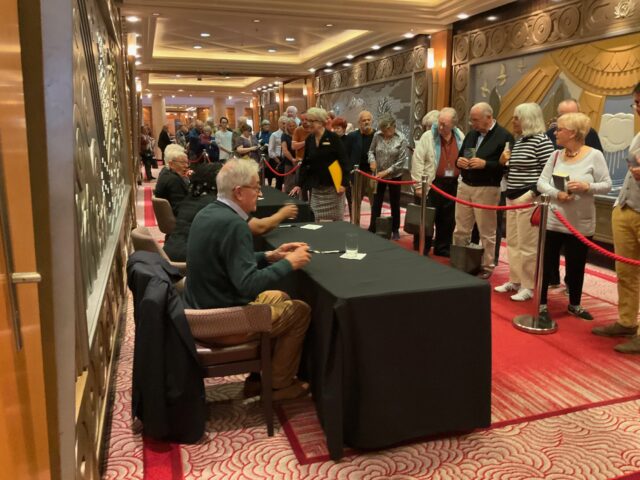
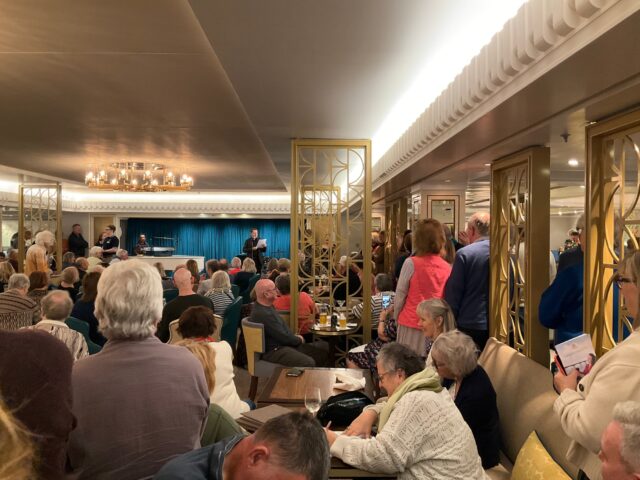
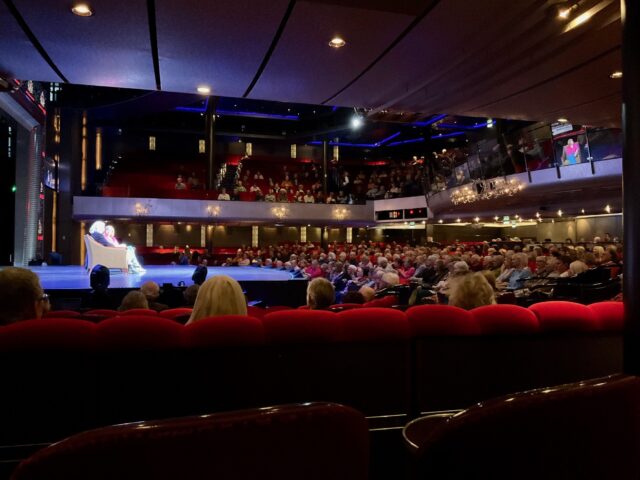
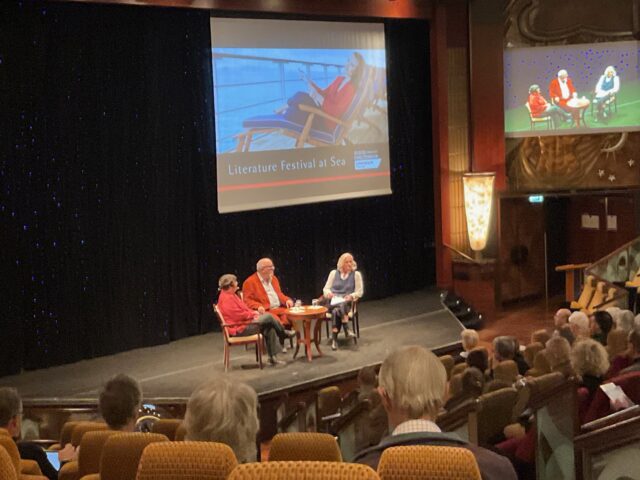
The Atlantic in November can be an unpredictable ocean. Having sailed out of Southampton on a grey, blustery evening, the sea conditions later in the crossing were officially described by the ship’s captain as ‘rough.’ On Thursday, there was a 6-metre swell accompanied by Storm Force 10 winds.
One famous festival speaker was unable to appear on Monday as he was confined to his cabin all day and, on Thursday, he needed to leave the stage mid-lecture in order to be sick. This is not a problem we face in Gibraltar, not even on the Sunborn.
Of course, there were some definite similarities between the two festivals. Both have several big headline names supported by some rather more specialist and slightly less well-known authors. In fact, in 2023, I think Gibraltar may have scored better with its big names of Lady Theresa May, Dame Mary Berry and Dame Andrea Leadsom. Meanwhile on the Queen Mary, the list of speakers included Alan Johnson (ex-Home Secretary), Alan Titchmarsh (celebrity gardener), Marcus Brigstock (a comic well-known to festival-goers in Gibraltar), Antony Beevor (historian), Linda La Plante and around 20 slightly less well-known (at least to me) authors and top Sunday Times journalists such as Lord Daniel Finkelstein and Matt Chorley.
A major difference between the two festivals was definitely the audience. A popular speaker at Gibraltar’s Garrison Library might attract an audience of around 100 people whereas, on the ship, the Royal Court Theatre was regularly packed with 1,000 avid book readers. Whilst an audience in Gibraltar might have a spread of ages and probably some Jewish or Moroccan blood, almost everyone on the Queen Mary, seemed to be retired, middle-class and very English (mainly from London and the Home Counties). It was as if Cunard had indulged in some form of ethnic cleansing at the Southampton passenger terminal where anyone who was young, non-English or not from a professional background had been turned away.
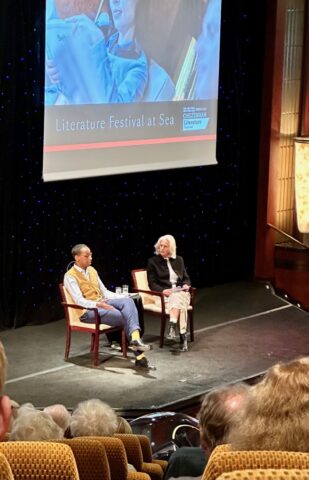
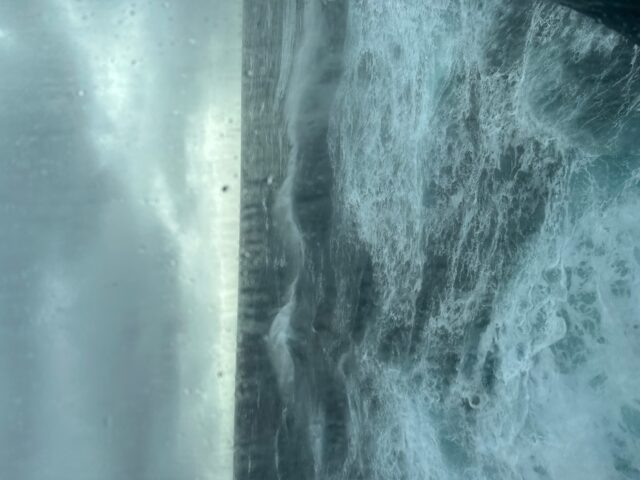
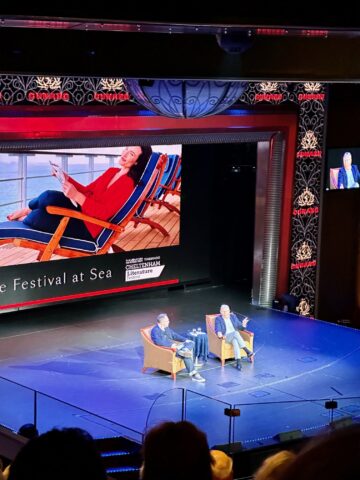

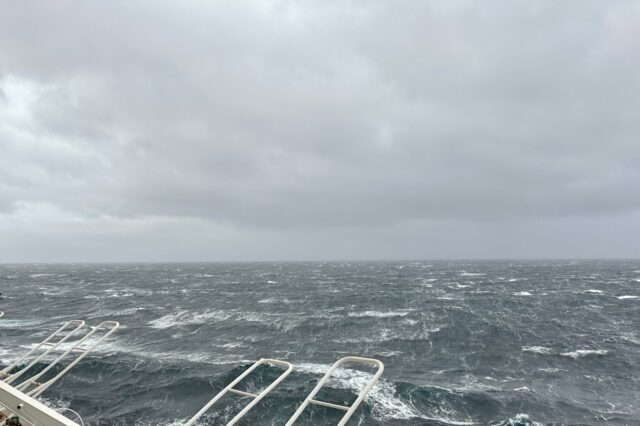
A less obvious difference between the two festivals was the daily schedule. On the Queen Mary 2, the two state-of-the-art lecture theatres were in use all day long. Passengers with a strong constitution could start at breakfast time and then attend as many as eight or nine lectures a day, even if they might need to rush from one venue to another to catch their favourite speakers. Just in case that wasn’t enough, there were various extra sessions in bars and restaurants around the ship.
As the Queen Mary 2’s voyage is non-stop, everyone was on board the ship for the full duration of the voyage: once we left Southampton, no-one could join the ship and no-one could leave. Consequently, the speakers found themselves mixing with their audiences all day, every day.
I was struck by the sight of big literary names waiting patiently in the queue for afternoon tea and, if tables were busy, asking if they could share with a couple of star-struck passengers. And, when waiting for a lecture to start, it was quite normal to hear, ‘Excuse me, excuse me,’ as a couple of famous authors crept into the theatre and shuffled past us into some empty seats. One morning, I had chosen to wear a pink checked shirt with a navy blue sleeveless jumper and, at breakfast, Alan Titchmarsh approached me in the restaurant and complimented me on my sartorial style. I then realised that he too was dressed in a pink checked shirt with a navy blue, sleeveless jumper!
Although we spent much of every day, listening to some excellent speakers, they were not the only reason to enjoy the trip. The food onboard was consistently superb with a choice of venues which ranged from extremely formal to very casual. However, I think it’s fair to say that drinks were very expensive in every bar and restaurant.
During our lunchtimes and before dinner each evening, we were able to listen (but not at the same time) to a harpist, a reggae band, an Irish folk duo, a classical pianist and a solo girl singer – and that doesn’t include the ship’s main variety show later in the evening. Incidentally, the stage show had to be cancelled on the Monday evening because the ship was rolling around so much that the dancers were unable to stand, let alone dance.
Given the age of most of the passengers, the night club down in the bowels of the ship didn’t get many visitors but, on the Tuesday evening, we thought we should check it out. It didn’t look very promising as there were only about 25 people there when the resident DJ was about to start a karaoke session.
But then, through the gloom of the club’s lighting (or lack of it) we saw that the 25 people who had signed up for the karaoke were almost all the festival’s main speakers who, as a group, were out on the town, letting their collective hair down. News spread and the club was soon full of onlookers who arrived just in time to hear, amongst others, Lord Finkelstein doing his Johnny Cash impression of ‘A Boy named Sue’, Val McDermid (not surprisingly) singing ‘500 miles’ and Alan Titchmarsh doing his version of Abba’s ‘Waterloo.’ What a fabulous atmosphere.
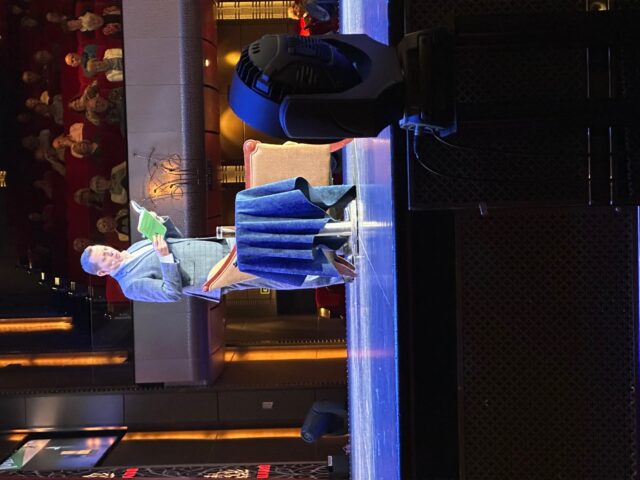
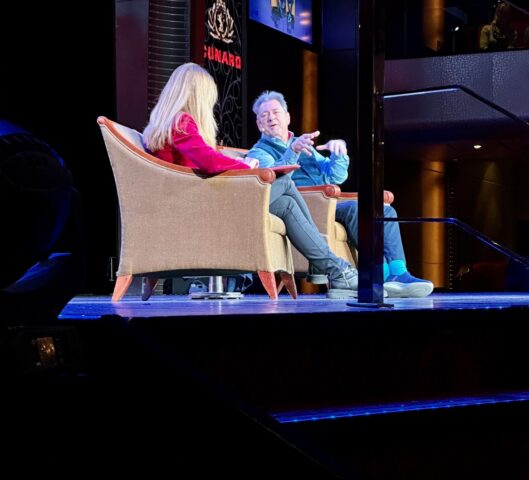
Another slight oddity of the festival at sea is caused by the time difference between UK and the east coast of the USA. As a result of this difference, we all had to put our clocks back by one hour most nights and so, most of the seven days were 25 hours long. Having 25 hours in the day is a great idea and one that I can strongly recommend.
On a more serious note, we heard some wonderful talks. Some like Titchmarsh, Finkelstein and Johnson were just excellent, as we had expected, but we were also treated to talks by lesser-known authors who were sometimes hilarious (especially those by Matt Chorley), often fascinating and sometimes heart-rending.
We could be faced with some tough decisions if we need to choose between the two festivals again next year.









